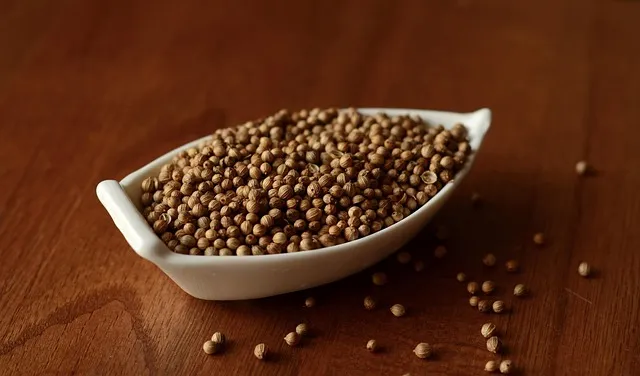Coriander, a Divine Gift For a Healthy Life.

Coriander is a feathery annual plant that produces seeds and leaves which are used as both an herb and a spice. The scientific name of the Coriander plant is Coriandum sativum which belongs to the parsley family (Apiaceae), yellowish-brown globular fruits are called coriander seeds and the leaves are called cilantro or chinese parsley.
It is one of the world’s oldest spices, it has been in use from the Mediterranean region to India and China.
Coriander seeds and leaves are a good source of fiber, minerals like calcium, magnesium, manganese, and iron, vitamins like vitamin A, vitamin C and Vitamin K, antioxidants like linalool, Quercetin and Rutin. Linalool and decanal are essential oils that are contained in coriander which contribute to its aroma and have therapeutic properties.
Those phytonutrients might lower blood pressure, reduce blood glucose level, reduce cholesterol level, improve digestion and elevate immunity against infections.
As a result of its numerous qualities, coriander has a variety of roles and applications in Ayurveda and traditional medicine. Here are some beneficial effects of Coriandum sativum plant.
- Cleansing property - coriander has the detoxifying property and cleanses the liver by removing accumulated fat and necrosis.
- Heart friendly - According to some studies coriander might have the ability to lower the heart disease risk factors like high blood pressure and LDL cholesterol levels. It acts as a diuretic which flushes out extra sodium and water in the body which leads to lowering blood pressure. The beneficial acids like linoleic acid, oleic acid, palmitic acid, stearic acid, and ascorbic acid (vitamin C) are present in the coriander seeds and are effective in reducing blood cholesterol level.
- Prevent obesity - Inflammation due to excessive triglyceride loading leads to increasing the plasma triglyceride concentrations, and limit fat mobilisation, eventually caused toxic ectopic fat deposition. C. sativum extracts have demonstrated the ability to reduce lipid accumulation and prevent adipogenesis at higher dosages due to their significant amounts of flavonoid and phenolic components with antioxidant potential.
- Immuno boosting property - it has been demonstrated to be effective in treating bacterial, fungal, and parasitic infections in traditional medicine. It is used to treat common colds in children at homes.
- Anti diabetic property - Insulin resistance which leads to type 2 diabetes, can be caused by chronic and systemic inflammation. Polyphenols can have a beneficial effect in fighting against inflammation. Coriander seeds extracts have those beneficial polyphenols which can effectively lower blood sugar by activating certain enzymes that act to remove sugar from the blood therefore, people with low blood sugar and people who take diabetes medication should use it cautiously.
- Anti inflammatory property - Coriander contains several antioxidants, which have been shown to fight inflammation in the body. These antioxidants not only fight against inflammation but also prevent cellular damage caused by free radicals and have anticancer and neuroprotective effects. Coriander may protect your brain from the ailments like Parkinson’s, Alzheimer’s, and multiple sclerosis which are associated with inflammation. Animal studies suggest antioxidants in coriander can improve memory and reduce anxiety symptoms, but more human research is needed. A study done in 2021 found that methanol extract from coriander seeds can protect against carrageenan-induced inflammation. Carrageenan is a food additive, a dietary emulsifier which is derived from red seaweed, commonly used to thicken and stabilize processed foods. While the FDA generally recognizes carrageenan as safe, some studies show it may cause digestive issues and inflammation in the digestive system which might be caused in colon cancer.
- Aid in digestion - Coriander is a rich source of essential oils, which may help in the digestion by proper secretion of digestive enzymes and digestive juices and stimulate peristaltic motion.The compounds in coriander like cineole, borneol, limonene, alpha-pinene, and beta-phellandrene have antibacterial effects, and are helpful in relieving diarrhea caused by microbial actions. Coriander may reduce unpleasant digestive symptoms, such as bloating and discomfort, that people with IBS often experience. It may also increase appetite in some people.
Literature review on the polyphenols produced by Coriandrum sativum shows that they have antioxidant and anti-inflammatory properties and are potentially useful to improve health by protecting cells in the body from aging and degenerative diseases caused by free radicals and oxidative stress.
All parts of the Coriandrum sativum plant are edible, but its seeds and leaves are mostly used in cooking. The seeds and leaves taste very different. The seeds have earthy flavor, which are used in curries, pickled and roasted vegetables, and sometimes the seeds are roasted, boiled in the water and drained to drink as a herbal tea. The leaves or the cilantro are best to garnish soup or cold salads like pasta salads, fresh tomato salad, or noodle dishes.
You can see that this herb can be considered a gift from the gods due to its numerous medicinal properties and its convenience to incorporate into the diet.
Author - Yashodha P. Jayalath
MSc in Food Science & Technology, PGIA University of Peradeniya, Sri Lanka.
BSc in Health Promotion, Rajarata University of Sri Lanka.
Pg Dip in Psychological Counselling & Psychotherapy, Institute of Psychological Studies Sri Lanka.
Associate Member of Sri Lanka National Institute of Professional Counsellors, Registration number 2015/1526